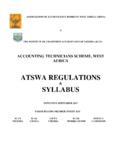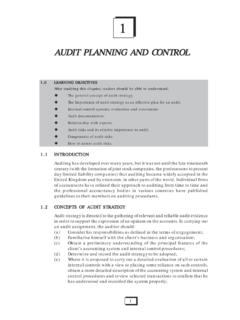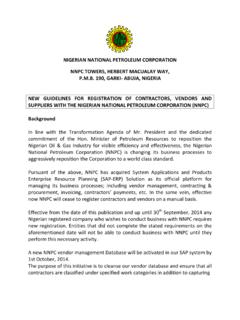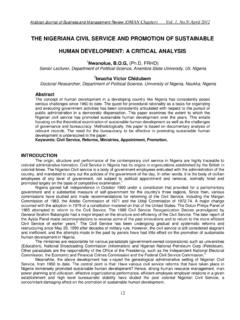Transcription of REGULATORY FRAMEWORK OF FINANCIAL …
1 1. REGUL. REGULAATORY FRAMEWORK OF. FINANCIAL REPORTING. REPORTING. LEARNING OBJECTIVES. After studying this chapter, the reader will be able to understand the: ! Need for the existence of a REGULATORY FRAMEWORK ;. ! Various REGULATORY FRAMEWORK for corporate FINANCIAL reporting;. ! Composition, functions and powers of the Nigerian Accounting Standards Board;. ! Processes involved in the production of an accounting standard; and ! Current Statements of Accounting Standards issued by NASB. INTRODUCTION. Regulation of accounting information is aimed at ensuring that users of FINANCIAL statements receive a minimum amount of information that will enable them take meaningful decisions regarding their interest in a reporting entity.
2 The bodies responsible for these regulations are often statutory agencies such as the Accounting Standards Board, Securities and Exchange Commission and the Stock Exchange. The bulk of this FRAMEWORK is usually contained in Accounting Standards. The Nigerian Accounting Standards Board is the body responsible for the issuance of Accounting Standards in Nigeria. This board, was initially an advisory body responsible for the production of standards that will serve as a guide to Accountants in the preparation of FINANCIAL statements. Until 2003, when the Nigerian Accounting Standards Board Act was enacted, which now makes it mandatory for accountants preparing corporate reports to adhere strictly to the provisions of the Accounting Standards issued by the board, the standards were treated as just generally accepted accounting principles.
3 This mandatory approach arises from the fact that there is the need to: (a) ensure uniformity in the preparation and presentation of corporate reports throughout the country;. (b) ensure that accountants comply with the Generally Accepted Accounting Principles in the discharge of their functions;. (c) ensure that the standards comply with existing REGULATORY frameworks;. (d) ensure that the standards comply with the domestic accounting need of our country. With the passing into law of the NASB Act 2003, the NASB is now the 1. FINANCIAL REPORTING AND ETHICS. only body recognized by law for the development, issuance and review of accounting standards for preparers and users of FINANCIAL statements.
4 OTHER REGUL. REGULAATORY FRAMEWORK . Other institutions responsible for the regulation of accounting information in Nigeria include: (a) The Central Bank of Nigeria (CBN);. (b) The Nigerian Insurance Commission (NAICOM);. (c) The Securities and Exchange Commission. Each of these REGULATORY authorities has an enabling law that guides the activities of the various institutions operating in the sector. The CBN has the Banks and Other FINANCIAL Institutions Act (BOFIA) 1991, NAICOM has the Nigerian Insurance Act 2003, while the Securities and Exchange Commission has the Investment and Securities Act, 1999. These Acts provide some specific requirements relating to the Accounts of every corporate entity within its fold.
5 BOFIA, for instance provides specific requirements relating to the minimum paid up capital, statutory reserves, lending limit, classification of assets, returns and publication of annual accounts by banks. The Insurance Act also provides for the minimum paid up capital, types and classification of insurance businesses, statutory deposit, books and accounting records to be kept, maintenance of technical reserves and solvency margin required by all insurance businesses in Nigeria. The Investment and Securities Act on the other hand makes provision for the registration of capital market operators, public offer and sale of securities and mergers, take-over and acquisitions.
6 All these requirements are made to supplement the elaborate provisions of the Nigerian Accounting Standards. COMPOSITION, FUNCTIONS AND POWERS OF THE NIGERIAN. ACCOUNTING ST ANDARDS BOARD. STANDARDS. C omposition The NASB was established in 1982 to issue accounting standards in Nigeria which will take into cognizance our peculiar business environment, customs, laws and level of economic development. From inception to date, the membership of the Board changed considerably from 8 to 13, 13 to 14 and to the present arrangement which provided for a four strata membership comprising of 17 members all of whom are appointed by the President. The present membership as provided under S.
7 2(2) of NASB Act, includes: (a) The Chairman;. (b) Two members each from the Institute of Chartered Accountants of Nigeria (ICAN) and the Association of National Accountants of Nigeria (ANAN). (c) A representative each from the following: 2. REGULATORY FRAMEWORK OF FINANCIAL REPORTING. (i) Federal Ministry of Commerce;. (ii) Federal Ministry of Finance;. (iii) Central Bank of Nigeria;. (iv) Nigerian Accounting Association (NAA);. (v) Corporate Affairs Commission;. (vi) Federal Inland Revenue Service;. (vii) Nigerian Deposit Insurance Corporation;. (viii) Securities and Exchange Commission;. (ix) Auditor General for the Federation;. (x) Accountant General of the Federation.
8 (xi) Chartered Institute of Taxation of Nigeria; and (xii) Nigerian Association of Chambers of Commerce, Industries, Mines and Agriculture . (d) The Executive Secretary of the Board. Each member of the Board shall hold office for a period of four years or on such terms or conditions that may be specified in their letters of appointment. Functions of the Boar Boardd The Board's functions as provided in S. 6 of the Act, include the following: (a) Developing and publishing in public interest, accounting standards to be observed in the preparation of FINANCIAL statements;. (b) Reviewing from time to time the accounting standards developed in line with the prevalent social, economic and political environments.
9 (c) Promoting and enforcing compliance with accounting standards developed or reviewed by the Board;. (d) Promoting the general acceptance and adoption of standards by preparers of FINANCIAL statements;. (e) Receiving from time to time notices of non-compliance with its standard from the preparers, users and auditors of an account;. (f) Receiving copies of all qualified reports together with detailed explanations for such qualifications from auditors of the accounts within a period of 60 days from the date of such qualifications;. (g) Advising the Minister on the making of regulations under S. 356. of Companies and Allied Matters Act;. (h) Advising the Federal Government on matters relating to accounting standards; and (i) Performing such other duties which, in the opinion of the Council, are necessary or expedient to ensure the efficient performance of the functions of the Board under this Act.
10 3. FINANCIAL REPORTING AND ETHICS. Powers Powers of the Board include the following: (a) Identifying accounting statements which require standardization and establish order of priority for addressing them;. (b) Determining the scope and objectives of each standard;. (c) Prescribing the methods and procedure for the production of standards;. (d) Prescribing the time-table for the production of standards;. (e) Approving discussion papers, exposure drafts and standards;. (f) Enforcing and approving enforcement of compliance with accounting standards in Nigeria; and (g) Exercising such powers as are necessary or expedient for giving effect to the provisions of this Act.
















